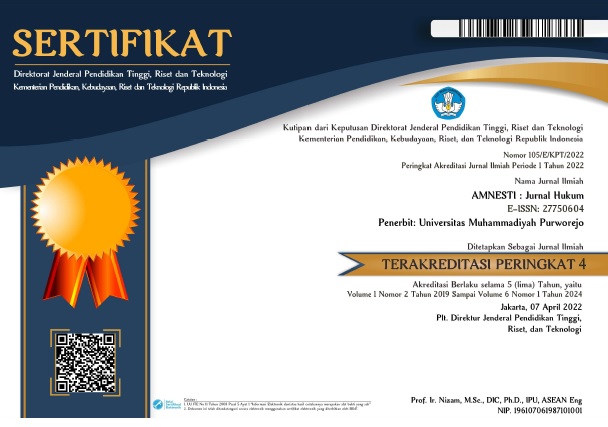A Juridical Review of the Open Proportional System in the 2024 General Election
Abstract
The emergence of the petition for judicial review of Case Number 114/PUU-XX/2022 against Law Number 7 of 2007 concerning General Elections has raised the political temperature of the country. The petitioners argued that the open proportional system was contrary to the 1945 Constitution and should therefore be replaced with a closed proportional system. The petitioners, who are political party officials, feel that the open proportional system has harmed their constitutional rights. This study aims to determine the extent to which the implementation of elections using an open proportional system can make the implementation of elections more democratic or, on the contrary, has created corrupt elections. A better alternative electoral system needs to be encouraged to realise a higher quality democracy. In general, the research method used in this research uses normative research by prioritising literature studies. The study is directed to be able to answer various problems that have been formulated as problem formulations. The result of this research is that elections with an open proportional system in reality cause rampant money politics, this is as a result of the intense internal competition of political parties. Therefore, it is necessary to encourage alternatives to make changes to the electoral system. The benefits of this research are expected to provide input to all stakeholders in elections, both the House of Representatives of The Republic of Indonesia (DPR RI), the Government, election organisers and political parties.
Downloads
References
Asshiddiqie, J. (2022). Penguatan Sistem Pemerintahan dan Peradilan. Sinar Grafika.
Budiardjo, M. (2008). Dasar-Dasar Ilmu Politik. Gramedia Pustaka Utama.
Chandra, M. J. A., & Ghafur, J. (2020). Peranan Hukum dalam Mencegah Praktik Politik Uang (Money Politics) dalam Pemilu di Indonesia: Upaya Mewujudkan Pemilu yang Berintegritas. Wajah Hukum, 4(1), 52. https://doi.org/10.33087/wjh.v4i1.167
Feinig, J. (2022). Moral Economies of Money: Politics and the Monetary Constitution of Society. Stanford University Press.
Firdaus, S. U. (2011). Relevansi Parliamentary Threshold Terhadap Pelaksanaan Pemilu yang Demokratis. Jurnal Konstitusi, 8(2), 91–112.
Gaffar, A. (2005). Politik Indonesia: Transisi Menuju Demokrasi. Pustaka Pelajar.
Goodwin-Gill, G. S. (2006). Free and Fair Elections. Inter-Parliamentary Union.
Hendarto, Y. M. (2023). Parpol Papan Tengah dan Bawah Dinam. Kompas.Com.
Huda, N. (2017). Penataan Demokrasi dan Pemilu di Indonesia. Kencana.
Jaang, S. (2023). Masa Depan Demokrasi: Proporsional Terbuka dan Tertutup. Jpkpm, 3(1), 99–106.
Marzuki, P. M. (2011). Penelitian Hukum. Kencana Prenada Media Group.
Pahlevi, I. (2014). Dinamika Sistem Pemilu Masa Transisi di Indonesia. Politica, 5(2), 111–135.
Saifulloh, P. P. A. (2022). Penafsiran Pembentuk Undang-Undang Membentuk Kebijakan Hukum Terbuka Presidential Threshold dalam Undang-Undang Pemilihan Umum yang Bersumber dari Putusan Mahkamah Konstitusi. Jurnal Rechts Vinding: Media Pembinaan Hukum Nasional, 11(1), 153–172.
Santos, A. A. Dos, Zauhar, S., & Rochmah, S. (2015). Implementasi Kebijakan Pengawasan Pemilihan Umum (Pemilu) Parlemen di Negara Timor-Leste Tahun 2012. Reformasi, 5(2).
Sapardiyono. (2015). Money Politics, Bagaimana Prakteknya. Kompasiana.Com. https://www.kompasiana.com/image/sapardiyono/54f7757ba333111a648%09b4581/money-politic-bagaimana-prakteknya?page=1
Soekanto, S. (2012). Pengantar Penelitian Hukum. UI Press.
Subekti, V. S. (2015). Dinamika Konsolidasi Demokrasi: Dasri Ide Pembaruan Sistem Politik hingga ke Praktik Pemerintah Demokrasi. Yayasan Obor Indonesia.
Sugiono. (2010). Metode Penelitian Kuantitatif Kualitatif & RND. Alfabeta.
Suratman, & Dillah, P. (2013). Metode Penelitian Hukum. Alfabeta.
Copyright (c) 2024 Amnesti: Jurnal Hukum

This work is licensed under a Creative Commons Attribution-NonCommercial 4.0 International License.






